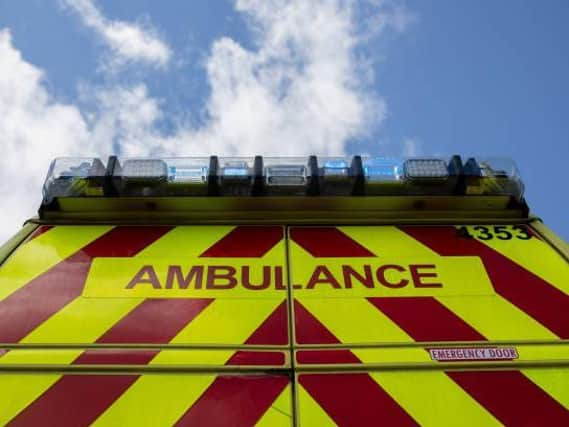'People will die' - concerns over plan to remove the last ambulance stationed at Rugby's St Cross


A decision to remove the last ambulance stationed at Rugby's St Cross has sparked concern for the safety of residents, with one source telling the Advertiser that they believe the decision will result in preventable deaths - but the ambulance service believes the change will not negatively affect patient safety.
Just 20 years ago Rugby had two ambulances and a paramedic with a car on standby for 24 hours a day, with an additional ambulance joining the reserve from between 12pm and 12am - the busiest times for callouts.
Advertisement
Hide AdAdvertisement
Hide AdDespite Rugby's rapid growth, the number of ambulances based in the town dwindled to one last year - and now the Advertiser has learned that this final ambulance, based at St Cross, will be re-located to Coventry in October.
A source told this newspaper that they believe this change would delay response times to those in the Rugby, Southam and Bulkington areas - leaving them concerned for the safety of residents.
When asked if people will die because of the decision, they replied: "People will die, I have no doubt people have already died because of past cuts - I don't have statistics to prove that, but I firmly believe it."
They added: "It's not just about deaths, take the example of strokes, where response time is critical.
Advertisement
Hide AdAdvertisement
Hide Ad"A delay in response can leave someone with life-changing disabilities."
The source already said they already have concerns over the response times for 999 ambulance calls in Rugby and the surrounding area - but they said this change will cause further deterioration.
They said: "Things will get to the point where it could take 20 or 30 minutes for an ambulance to get there - and that's just for the Rugby area, in places like Southam it could be even worse.
"To put that in context - that target response time for a Category One [the most serious] call is eight minutes.
Advertisement
Hide AdAdvertisement
Hide Ad"West Midlands Ambulance Service is one of the best in the country for response times if you look at the figures that are published.
"But these are calculated for the whole area - and the service floods Coventry and Birmingham with ambulances so this brings the average up.
"If you could get hold of figures for areas like Rugby specifically you would find something very different."
The Advertiser put these concerns to the West Midlands Ambulance Service (WMAS).
Advertisement
Hide AdAdvertisement
Hide AdA spokesperson for WMAS said the existence of Community Ambulance Stations (CAS) does not have a bearing on Ambulance response times.
To illustrate their point, they outlined some data from the first six months of this year:
Rugby
Total cases: 47,972
Cases attended by Rugby ambulance: 1,632
Percentage: 3.4 per cent
Based on these figures, they said that 96.6 per cent of callouts in Rugby are attended by ambulances not based in Rugby.
Fewer than half of those total callouts required a patient to be taken to hospital, so this, the spokesperson said, means that the ambulances attending half those callouts will then be in the area for some time, ready to respond to another emergency call.
Advertisement
Hide AdAdvertisement
Hide AdThey added that many ambulances are so busy attending various jobs that they rarely have time outside of breaks and shift changes to return to the CAS - with ambulance crews sometimes ending up attending jobs in completely different areas.
They said: "One of the questions we are duty bound to consider is whether it is appropriate for the Trust to spend precious funds on a building that is rarely used when these could instead be spent on additional staff and vehicles; the things that save lives?"
A source told the Advertiser that this argument holds true when the ambulance service is busy - but the danger lies in quieter times, when ambulance crews have time to return to their Coventry base - meaning, they said, an ambulance might have to come all the way from Coventry to respond.
When asked about specific response times for the Rugby area, the spokesperson for WMAS said the service does not record statistics in that way - meaning that such figures would have to be obtained via a Freedom of Information request, which can take up to 28 working days.
Advertisement
Hide AdAdvertisement
Hide AdHowever, the spokesperson explained that the service logs every Category One call in which an ambulance does not arrive in the target time - each one of these incidents, they said, is then investigated.
The WMAS spokesperson added that for many Category One calls, even with ambulances reaching tough response targets, many deaths could be prevented if more people know CPR and there were more defibrillators in the community.
A key factor in slower response times recently has been an increase in handover time - the amount of time it takes for paramedics to be get a patient into the hospital once they are on site.
They said: "We are supposed to do so within 15 minutes of arriving at an A&E department.
Advertisement
Hide AdAdvertisement
Hide Ad"Unfortunately, many of the hospitals in our region are extremely challenged and this has led to some very long delays.
"Indeed, in recent weeks, we have had crews wait over 11 hours to hand their patient over.
"During July, there were many days when we were losing over 1,000 hours of ambulance time while crews waited to hand over patients – that is the equivalent of taking 85 ambulances off the road and putting them in a car park and deciding not to use them that day.
"You can only imagine the challenges this brought us."